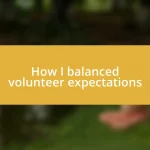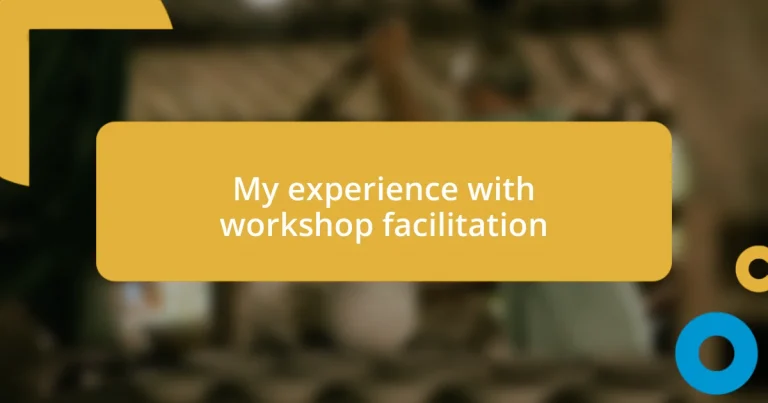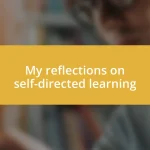Key takeaways:
- Facilitation fosters meaningful dialogue and personal growth, highlighting the importance of trust and connection among participants.
- Essential skills for facilitators include active listening, adaptability, and emotional intelligence to effectively engage and address group dynamics.
- Continuous improvement through feedback, reflection, and collaboration enhances facilitation practices and strengthens participant relationships.
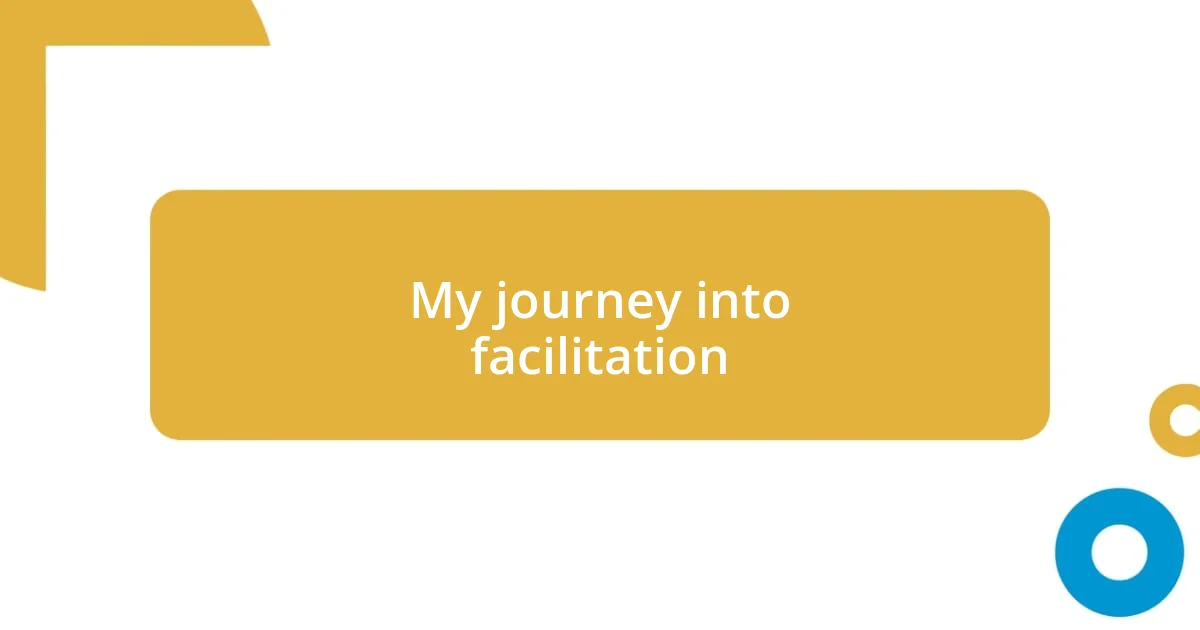
My journey into facilitation
I stumbled into facilitation almost by accident. A colleague noticed my knack for guiding discussions and suggested that I lead a workshop on team dynamics. I remember feeling a mix of excitement and doubt—could I really do it? That first session was a whirlwind, filled with nervous energy. But when I saw those “aha” moments light up participants’ faces, I felt a spark ignite within me.
As I continued to facilitate workshops, I discovered the profound impact of creating a safe space for people to share their thoughts. I recall one particular workshop where a participant opened up about their struggles with communication. The room shifted; you could almost feel the collective empathy. Have you ever been in a situation where vulnerability bridged gaps? That day drove home the importance of fostering trust in facilitation—it’s the bedrock of meaningful dialogue.
With each workshop, I realized that facilitation was not just about guiding conversations, but about truly connecting with others. I often found myself reflecting on how facilitation allows for growth—not only for participants but for me as well. It’s funny, isn’t it? The more I helped others find their voice, the more I discovered my own.
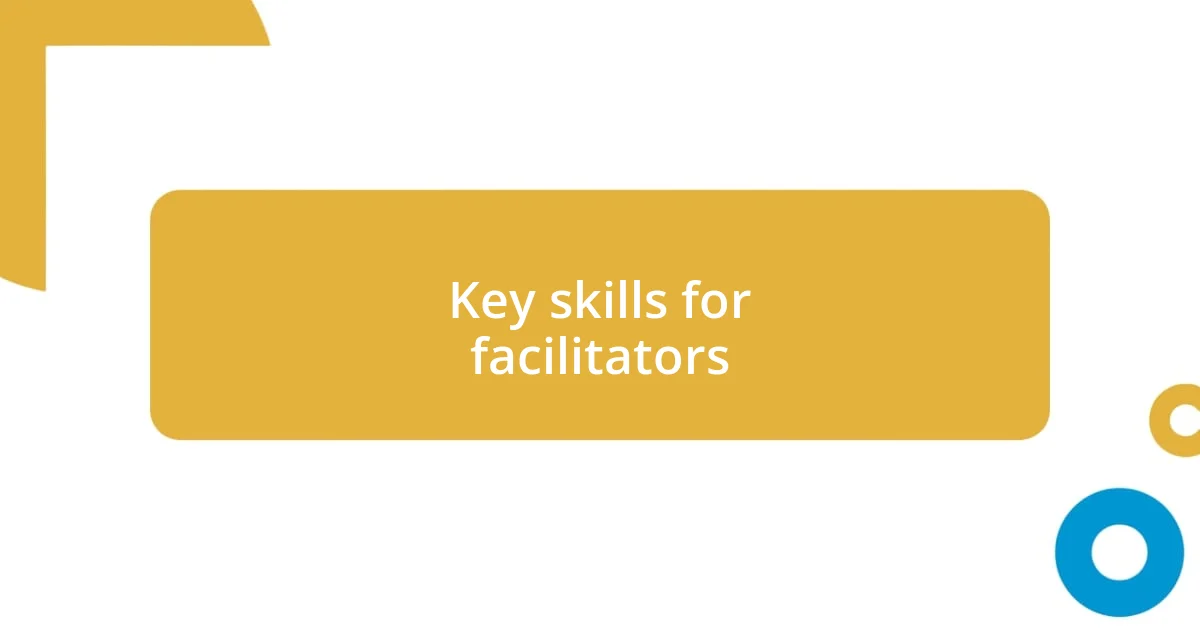
Key skills for facilitators
Facilitators need to possess a variety of skills to effectively guide discussions and foster a collaborative environment. One crucial skill is active listening. In my experience, truly hearing what participants say—beyond just their words—can unveil deeper insights. I remember a workshop where I noticed a participant hesitating to speak. By giving them space and encouraging them, they later shared perspectives that transformed our discussion. This taught me that listening is not merely about hearing; it’s about understanding and validating voices.
Another key skill is adaptability. Each group of participants brings unique dynamics, and as a facilitator, being flexible enough to navigate these changes is vital. I once facilitated a workshop that took an unexpected turn when a heated debate erupted. Instead of attempting to steer the conversation back on track, I chose to embrace it, facilitating a constructive dialogue that allowed diverse viewpoints to emerge. This experience underscored that sometimes, the best path is the one that deviates from the plan.
Lastly, cultivating emotional intelligence is invaluable. Understanding the emotional undercurrents in a group can significantly influence the outcomes of a workshop. I recall a session where tensions were high, and instead of pushing through, I paused and addressed the feelings in the room. A simple acknowledgment of emotions diffused the situation and encouraged a more open exchange of ideas. This reinforced for me that emotional awareness is essential for fostering genuine connections and meaningful conversations.
| Skill | Description |
|---|---|
| Active Listening | Understanding participants’ words and emotions to create deeper connections. |
| Adaptability | Flexibility in response to the group’s unique dynamics and needs. |
| Emotional Intelligence | Acknowledging and addressing emotional cues to foster a safe space for dialogue. |
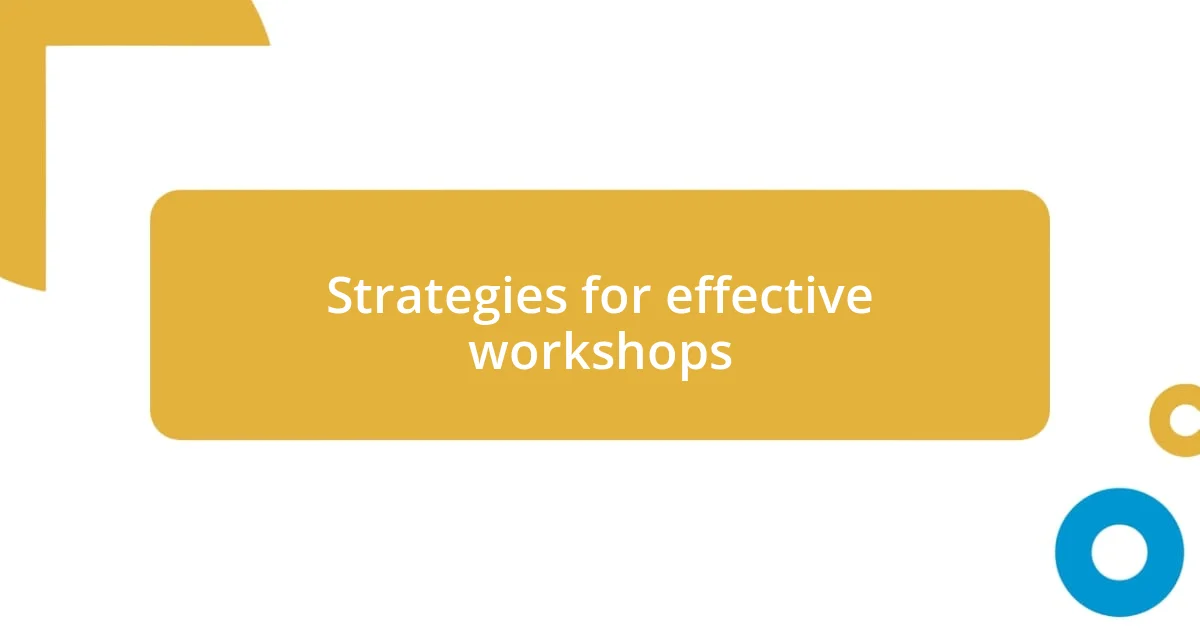
Strategies for effective workshops
In my experience, establishing clear objectives at the outset is a foundational strategy for effective workshops. Setting specific goals not only guides the flow of the session but also helps participants feel aligned and focused. The most memorable workshops I led had an agenda that participants contributed to, making them feel invested from the beginning. It’s fascinating how co-creating the process engenders commitment and enthusiasm.
- Clarify Objectives: Define what the workshop aims to achieve, ensuring everyone knows the goals.
- Engage Participants: Involve attendees in shaping the agenda; this fosters ownership and interest.
- Utilize Visual Aids: Tools like whiteboards or digital slides can enhance engagement and comprehension.
Another powerful strategy I learned is the significance of varied activities. I remember a workshop where I integrated small group discussions, role-playing, and interactive polls. The room buzzed with energy, and participants seemed more engaged than ever. Mixing methods caters to different learning styles, ensuring that everyone remains involved and that different perspectives are explored. It reminds me of a jigsaw puzzle; when all the pieces come together, the picture is more vibrant and complete.
- Mix Activities: Incorporate a variety of formats such as discussions, hands-on exercises, and reflective moments.
- Incorporate Breaks: Allow time for participants to recharge and process information.
- Gather Feedback: Regularly check in on participants’ thoughts to adjust the flow and maintain engagement.
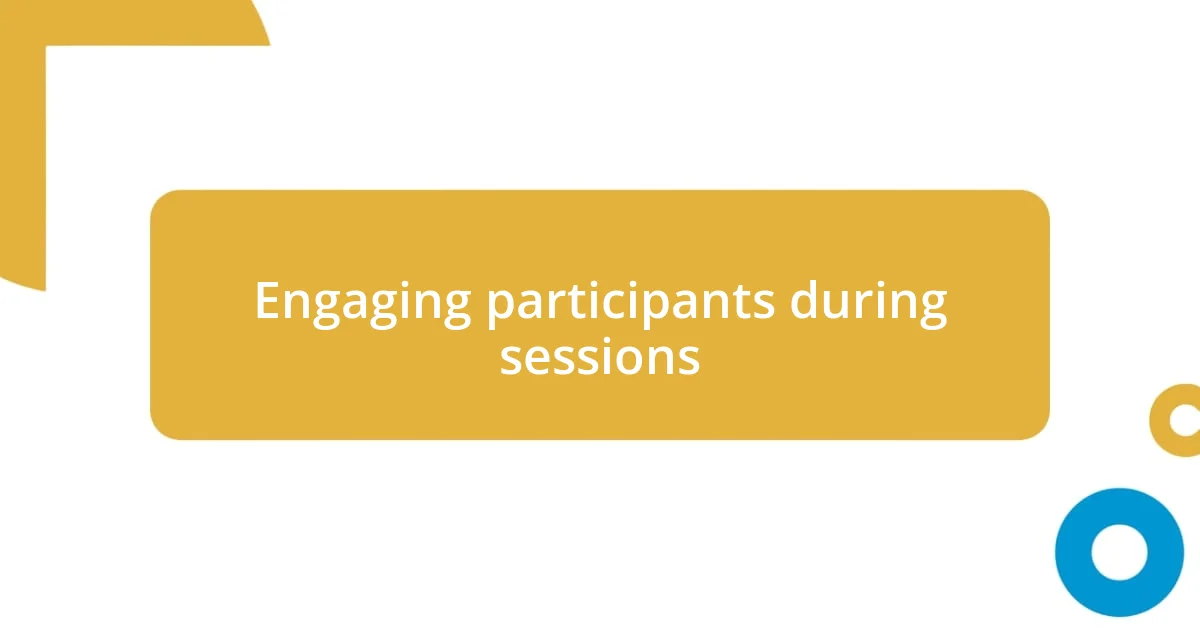
Engaging participants during sessions
Engaging participants during sessions is all about creating an environment where everyone feels valued and excited to contribute. I once held a workshop where I introduced a simple ice-breaker activity—participants shared a unique fact about themselves. The atmosphere transformed immediately, and laughter filled the room. This small step broke down barriers and set a positive tone, proving how essential it is to create personal connections right from the start. How can a simple activity lead to such a shift in dynamics? It’s all about fostering a sense of belonging.
Another technique I’ve found effective is using strategic questioning to draw out insights and encourage participation. During one session, I framed a challenge-related question and opened the floor for responses. The answers weren’t just informative; they sparked a lively discussion among attendees who built off each other’s thoughts. I could see the enthusiasm grow as participants recognized the value of their input. It’s fascinating how a well-timed question can shift the energy in the room, isn’t it?
Finally, I’ve realized that checking in with participants each step of the way makes a significant impact. In a recent workshop, I paused regularly to gauge everyone’s thoughts and feelings about the material we were discussing. Each pause allowed me to adjust our approach, ensuring that no one felt lost or disengaged. After one such check-in, a participant expressed gratitude for being heard, which solidified a deeper connection in the group. It’s moments like these that illustrate the power of engagement—it’s not just about delivering content; it’s about fostering an interactive dialogue.
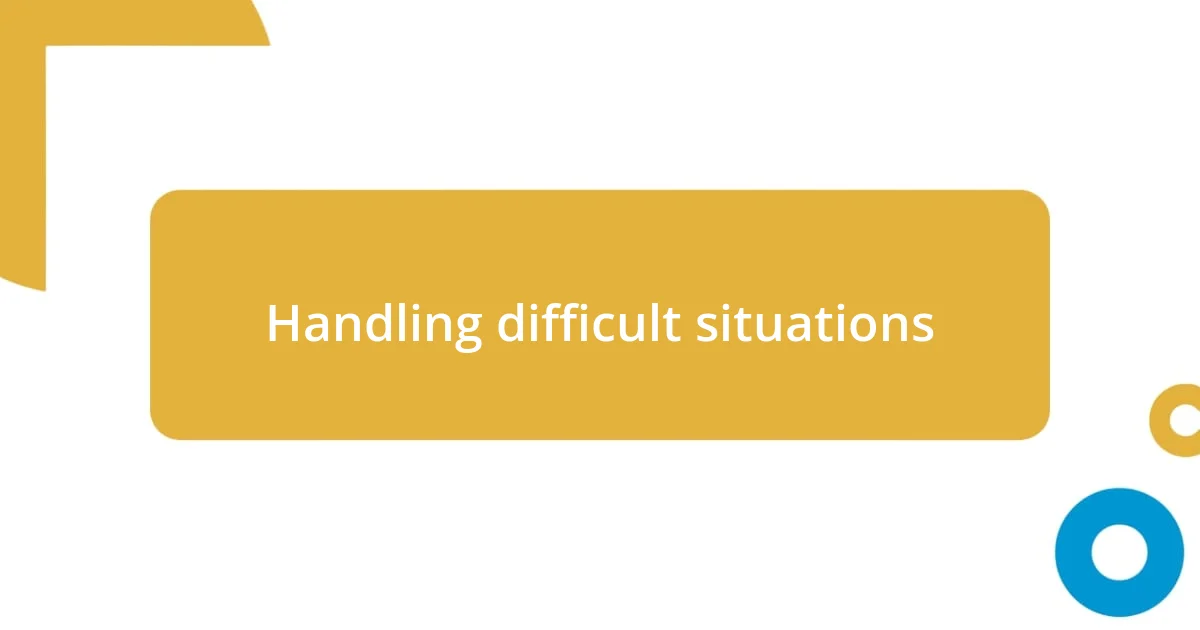
Handling difficult situations
Handling difficult situations in workshops is something that can test even the most seasoned facilitators. I remember a particular session where one participant dominated the conversation, leaving others feeling sidelined. It was a tricky moment. I took a deep breath and gently asked if anyone else had thoughts to share, effectively giving others a chance to contribute. This approach not only balanced the conversation but also diffused the tension in the room. Have you ever encountered a similar situation? It’s amazing how a little nudge can encourage voices that might otherwise go unheard.
Sometimes, you’ll face emotional reactions from participants, which can really change the atmosphere. I once led a workshop where a participant became visibly upset over a topic we were discussing. I paused and acknowledged their feelings, urging other attendees to share their own experiences. This created a deeper conversation about vulnerability and trust, transforming a potentially uncomfortable moment into a powerful learning experience. I found it curious how addressing emotions head-on can shift group dynamics so profoundly. How do you handle emotional moments in your workshops?
Moreover, when conflict arises among participants, it’s crucial to remain neutral and facilitate a constructive conversation. During one workshop, two individuals strongly disagreed on a critical point, and the conversation was becoming heated. I intervened with a calm tone, inviting each to articulate their perspectives without interruption. This not only helped in cooling down the situation but also highlighted the value of differing opinions. I often wonder—how can we harness conflict to foster growth? In my experience, embracing these challenging moments can lead to richer discussions and a stronger sense of community among participants.
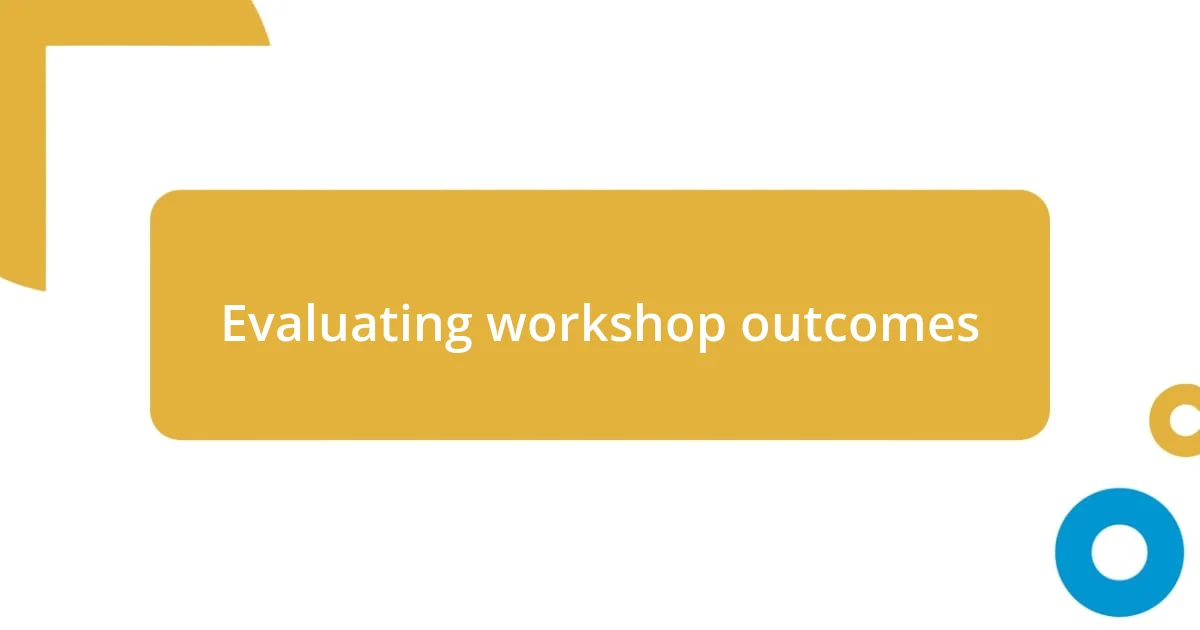
Evaluating workshop outcomes
Evaluating workshop outcomes is a pivotal step that often goes unnoticed. After one of my sessions, I took the time to send out a brief survey asking participants what they found most valuable. The responses were eye-opening. I learned that while I thought the group activities were engaging, attendees specifically highlighted a deep dive discussion I facilitated as the most impactful moment. It made me realize how crucial it is to seek direct feedback—it can reveal the true highlights of your workshop that you might overlook.
I also find that reflecting on my own observations during the workshop plays a significant role in evaluation. For instance, during one session, I noticed a few participants were less engaged when I shifted the pace of the discussion. Afterward, I tailored my follow-up actions based on this insight, offering additional resources to those individuals. It’s fascinating how taking a moment to assess not just the content delivered, but the participants’ reactions, can inform future workshops. This reflection made me wonder—what are the hidden cues we often miss?
Furthermore, I advocate for ongoing evaluation beyond just the immediate feedback. In a recent workshop series, I initiated a follow-up discussion a month later to see how the insights had been applied in real-world scenarios. Hearing participants share their successes felt rewarding and reinforced my belief in the importance of sustained engagement. Isn’t it rewarding to know that your efforts have a lasting impact? By fostering this ongoing connection, I not only gleaned valuable insights for improvement but also deepened my relationship with participants.
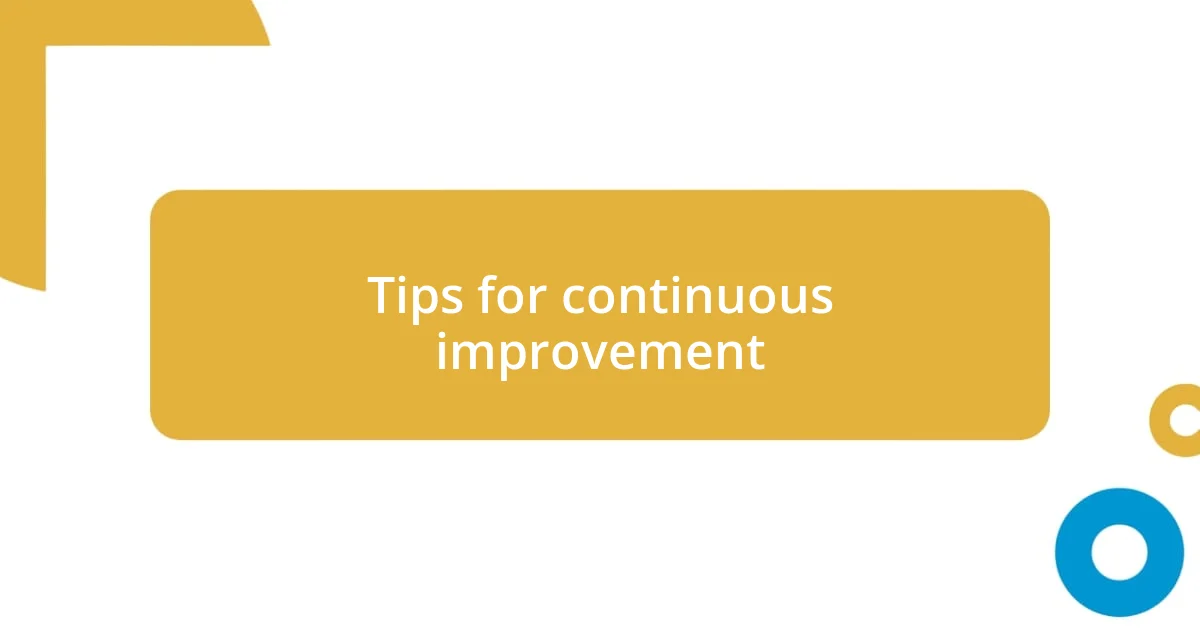
Tips for continuous improvement
One of the most influential tips I’ve gathered for continuous improvement is to embrace a growth mindset. In my early days of facilitation, I viewed mistakes as failures, which made me anxious. However, shifting my perspective to see each misstep as a learning opportunity has been transformative. Now, I often ask myself, “What can I take away from this experience?” This simple question opens up avenues for personal and professional growth that I didn’t recognize before. Have you ever caught yourself fixating on a mistake instead of focusing on the lesson?
Additionally, I’ve found that collaborating with peers post-workshop is invaluable. I remember a particularly enlightening conversation with a fellow facilitator after a session on creativity. We shared our experiences, discussing what worked and what didn’t. This practice not only provides fresh insights but also sparks innovative ideas for future workshops. Engaging in candid discussions like this encourages an atmosphere of continual learning. How do you approach these collaborative opportunities?
Lastly, I recommend keeping a facilitation journal. Documenting my thoughts, feelings, and participant reactions after each workshop has been a game-changer. One particular entry from a workshop on conflict resolution made me appreciate the power of silence—I realized that giving participants space to reflect leads to deeper insights. This journal serves as a treasure trove of experiences that I can reference in the future, guiding my journey and ensuring I don’t overlook key lessons. Have you captured your experiences in a way that helps you grow? It’s amazing how much depth you can find in your reflections.



